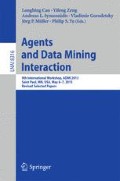Abstract
Joint learning from argumentation is the idea that groups of agents with different individual knowledge take part in argumentation to communicate with each other to improve their learning ability. This paper focuses on association rule, and presents MALA, a model for argumentation based multi-agent joint learning which integrates ideas from machine learning, data mining and argumentation. We introduce the argumentation model Arena as a communication platform with which the agents can communicate their individual knowledge mined from their own datasets. We experimentally show that MALA can get a shared and agreed knowledge base and improve the performance of association rule mining.
Access this chapter
Tax calculation will be finalised at checkout
Purchases are for personal use only
Notes
- 1.
UCI machine learning repository: http://archive.ics.uci.edu/ml/datasets.
References
Možina, M., Žabkar, J., Bench-Capon, T., Bratko, I.: Argument based machine learning applied to law. Artif. Intell. Law 13(1), 53–73 (2005)
Ontanón, S., Plaza, E.: Arguments and counterexamples in case-based joint deliberation. In: Maudet, N., Parsons, S., Rahwan, I. (eds.) ArgMAS 2006. LNCS (LNAI), vol. 4766, pp. 36–53. Springer, Heidelberg (2007)
Governatori, G., Stranieri, A.: Towards the application of association rules for defeasible rules discovery. In: Jurix 2001, pp. 63–75 (2001)
Gómez, S.A., Chesnevar, C.I.: Integrating defeasible argumentation and machine learning techniques. arXiv preprint: cs/0402057 (2004)
Ontañón, S., Plaza, E.: Multiagent inductive learning: an argumentation-based approach. In: Proceedings of the ICML-2010, 27th International Conference on Machine Learning, pp. 839–846 (2010)
Wardeh, M., Bench-Capon, T., Coenen, F.: PADUA: a protocol for argumentation dialogue using association rules. Artif. Intell. Law 17(3), 183–215 (2009)
Wardeh, M., Bench-Capon, T., Coenen, F.: Multi-party argument from experience. In: McBurney, P., Rahwan, I., Parsons, S., Maudet, N. (eds.) ArgMAS 2009. LNCS (LNAI), vol. 6057, pp. 216–235. Springer, Heidelberg (2010)
Wardeh, M., Bench-Capon, T., Coenen, F.: Arguing from experience using multiple groups of agents. Argum. Comput. 2(1), 51–76 (2011)
Wardeh, M., Coenen, F., Bench-Capon, T., Wyner, A.: Multi-agent based classification using argumentation from experience. In: Huang, J.Z., Cao, L., Srivastava, J. (eds.) PAKDD 2011, Part II. LNCS (LNAI), vol. 6635, pp. 357–369. Springer, Heidelberg (2011)
Nonaka, I., Takeuchi, H.: The Knowledge-Creating Company: How Japanese Companies Create the Dynamics of Innovation. Oxford University Press, Oxford (1995)
Yao, L., Xu, J., Li, J., Qi, X.: Evaluating the valuable rules from different experience using multiparty argument games. In: IEEE/WIC/ACM International Conference on Web Intelligence and Intelligent Agent Technology: WI-IAT12, Macao, China (2012)
Cao, L., Gorodetsky, V., Mitkas, P.: Agent mining: the synergy of agents and data mining. IEEE Intell. Syst. 24(3), 64–72 (2009)
Coenen, F., Leng, P., Ahmed, S.: Data structure for association rule mining: t-trees and p-trees. IEEE Trans. Knowl. Data Eng. 16(6), 774–778 (2004)
Coenen, F.: The LUCS-KDD TFPC classification association rule mining algorithm. University of Liverpool, Department of Computer Science (2004)
Author information
Authors and Affiliations
Corresponding author
Editor information
Editors and Affiliations
Rights and permissions
Copyright information
© 2014 Springer-Verlag Berlin Heidelberg
About this paper
Cite this paper
Xu, J., Yao, L., Li, L., Li, J. (2014). Multi-Agent Joint Learning from Argumentation. In: Cao, L., Zeng, Y., Symeonidis, A., Gorodetsky, V., Müller, J., Yu, P. (eds) Agents and Data Mining Interaction. ADMI 2013. Lecture Notes in Computer Science(), vol 8316. Springer, Berlin, Heidelberg. https://doi.org/10.1007/978-3-642-55192-5_2
Download citation
DOI: https://doi.org/10.1007/978-3-642-55192-5_2
Published:
Publisher Name: Springer, Berlin, Heidelberg
Print ISBN: 978-3-642-55191-8
Online ISBN: 978-3-642-55192-5
eBook Packages: Computer ScienceComputer Science (R0)

